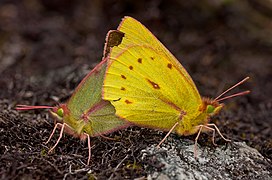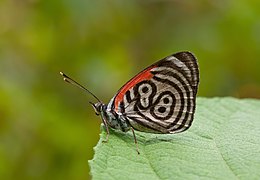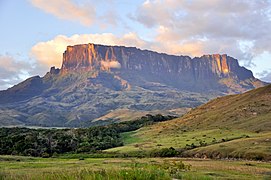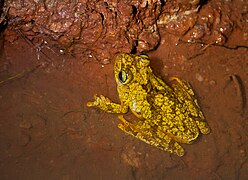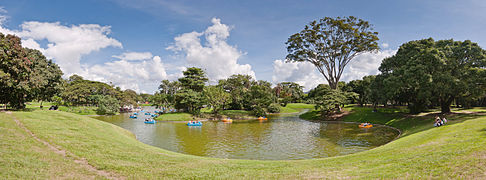
Portal:Venezuela
The Venezuela Portal Venezuela, officially the Bolivarian Republic of Venezuela, is a country on the northern coast of South America, consisting of a continental landmass and many islands and islets in the Caribbean Sea. It comprises an area of 916,445 km2 (353,841 sq mi), and its population was estimated at 29 million in 2022. The capital and largest urban agglomeration is the city of Caracas. The continental territory is bordered on the north by the Caribbean Sea and the Atlantic Ocean, on the west by Colombia, Brazil on the south, Trinidad and Tobago to the north-east and on the east by Guyana. Venezuela is a presidential republic consisting of 23 states, the Capital District and federal dependencies covering Venezuela's offshore islands. Venezuela is among the most urbanized countries in Latin America; the vast majority of Venezuelans live in the cities of the north and in the capital.  The territory of Venezuela was colonized by Spain in 1522 amid resistance from Indigenous peoples. In 1811, it became one of the first Spanish-American territories to declare independence from the Spanish and to form part of the first federal Republic of Colombia (Gran Colombia). It separated as a full sovereign country in 1830. During the 19th century, Venezuela suffered political turmoil and autocracy, remaining dominated by regional military dictators until the mid-20th century. From 1958, the country had a series of democratic governments, as an exception where most of the region was ruled by military dictatorships, and the period was characterized by economic prosperity.  The 2024 presidential election were not recognized by the Carter Center and Organization of American States due to the lack of granular results, and disputed by the opposition, leading to protests across the country. (Full article...) 
Selected article -The Venezuelan coup attempt of February 1992 was an attempt to seize control of the government of Venezuela by the Hugo Chávez-led Revolutionary Bolivarian Movement-200 (MBR-200) that took place on 4 February 1992. The coup was directed against President Carlos Andrés Pérez and occurred in a period marked by economic liberalization reforms, which were attempted in order to decrease the country's level of indebtedness and had caused major protests and social unrest. Despite their failure to depose the government of Carlos Andrés, the February coup attempts brought Chávez into the national spotlight. Fighting during the coup resulted in the deaths of at least 143 people and possibly as many as several hundred. (Full article...) 
Selected picture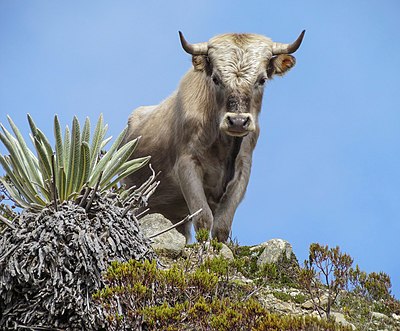

This is a feral Charolais cattle in the Venezuelan Sierra Nevada. The Charolais is a French breed of taurine beef cattle. It originates in, and is named for, the Charolais area of eastern France. Charolais are raised for meat; they may be crossed with other breeds, including Angus and Hereford cattle.
Selected biography -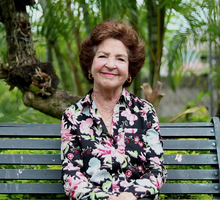 Gloria Lizárraga de Capriles (2 May 1944 – 31 March 2021) was a Venezuelan politician who was the first mayor of the Baruta municipality elected by direct vote, as well as the first woman elected to the position. She has been described as one of the pioneering women in Venezuelan politics. (Full article...) 
In this month...
Did you know (auto-generated) -
Selected list -The Luis Aparicio Award is given annually to a Venezuelan player in Major League Baseball (MLB) who is judged to have recorded the best individual performance in that year. The winner of the award is determined by a vote conducted by Venezuelan sports journalists and Spanish-language media around the world. It is named after former MLB shortstop Luis Aparicio, who is the only player from Venezuela to be inducted into the National Baseball Hall of Fame. The award was first presented in 2004, and was created in order to honour Aparicio's major league career and to commemorate his father, who died thirteen years before his son was elected into the Hall of Fame.  Johan Santana, Jose Altuve, Miguel Cabrera, and Ronald Acuña Jr. are the only players to win the Luis Aparicio Award more than once, with Cabrera having won the award five times. Cabrera won the MLB Most Valuable Player (MVP) Award and Hank Aaron Award alongside the Luis Aparicio Award in 2012 and 2013, becoming the first Venezuelan to win the MLB MVP Award. Santana, the 2004 and 2006 recipient, also won the Cy Young Award in those two years, winning by a unanimous vote on each occasion. Altuve is the only player to win the Luis Aparicio Award, the MVP award, and become a World Series champion in the same season in 2017. He has also won a batting title in three of his four award seasons. Santana (2006) and Cabrera (2012) are the only award winners to also earn the pitching and batting Triple Crown respectively in the same season. In accomplishing the feat, Cabrera became the first player in 45 years to achieve a Triple Crown in batting since Carl Yastrzemski in 1967, while Santana became the first pitcher since Dwight Gooden in 1985 to secure a "Major League Triple Crown" by leading all of MLB in wins, earned run average and strikeouts. Francisco Rodríguez compiled a major league record of 62 saves in a single season in 2008 and went on to win the Rolaids Relief Man Award in the same year as the Luis Aparicio Award. Five winners – Cabrera, Altuve, Magglio Ordóñez, Carlos González, and Arráez – were batting champions in their respective leagues in the same year they won the award. (Full article...) 
Current events
More did you know...
TopicsCategoriesRecognized content
Featured articlesGood articles
Featured pictures
New articlesThis list was generated from these rules. Questions and feedback are always welcome! The search is being run daily with the most recent ~14 days of results. Note: Some articles may not be relevant to this project.
Rules | Match log | Results page (for watching) | Last updated: 2025-01-25 23:01 (UTC)  Note: The list display can now be customized by each user. See List display personalization for details. 
Things you can doWikiProjects
Related portalsAssociated WikimediaThe following Wikimedia Foundation sister projects provide more on this subject: 
Discover Wik.ipedia.Pro using portals
|
See what we do next...
OR
By submitting your email or phone number, you're giving mschf permission to send you email and/or recurring marketing texts. Data rates may apply. Text stop to cancel, help for help.
Success: You're subscribed now !







